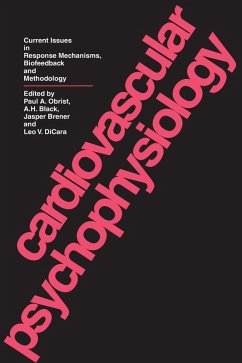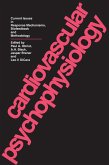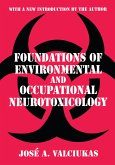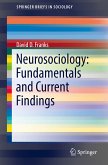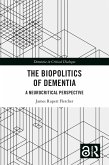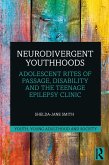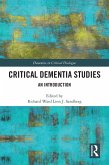Paul A. Obrist, A. H. Black, Jasper Brener, Leo V. DiCara
Cardiovascular Psychophysiology (eBook, PDF)
Current Issues in Response Mechanisms, Biofeedback and Methodology
52,95 €
52,95 €
inkl. MwSt.
Sofort per Download lieferbar

26 °P sammeln
52,95 €
Als Download kaufen

52,95 €
inkl. MwSt.
Sofort per Download lieferbar

26 °P sammeln
Jetzt verschenken
Alle Infos zum eBook verschenken
52,95 €
inkl. MwSt.
Sofort per Download lieferbar
Alle Infos zum eBook verschenken

26 °P sammeln
Paul A. Obrist, A. H. Black, Jasper Brener, Leo V. DiCara
Cardiovascular Psychophysiology (eBook, PDF)
Current Issues in Response Mechanisms, Biofeedback and Methodology
- Format: PDF
- Merkliste
- Auf die Merkliste
- Bewerten Bewerten
- Teilen
- Produkt teilen
- Produkterinnerung
- Produkterinnerung

Bitte loggen Sie sich zunächst in Ihr Kundenkonto ein oder registrieren Sie sich bei
bücher.de, um das eBook-Abo tolino select nutzen zu können.
Hier können Sie sich einloggen
Hier können Sie sich einloggen
Sie sind bereits eingeloggt. Klicken Sie auf 2. tolino select Abo, um fortzufahren.

Bitte loggen Sie sich zunächst in Ihr Kundenkonto ein oder registrieren Sie sich bei bücher.de, um das eBook-Abo tolino select nutzen zu können.
A comprehensive overview of the entire field of cardiovascular psychophysiology. This book provides an overview of the subject and the contemporary measurement techniques. It contains six experimental studies of cardiovascular function dealing with the interactive nature of cardiovascular and behavioral events.
- Geräte: PC
- mit Kopierschutz
- eBook Hilfe
- Größe: 35.35MB
Andere Kunden interessierten sich auch für
![Cardiovascular Psychophysiology (eBook, ePUB) Cardiovascular Psychophysiology (eBook, ePUB)]() Paul A. ObristCardiovascular Psychophysiology (eBook, ePUB)52,95 €
Paul A. ObristCardiovascular Psychophysiology (eBook, ePUB)52,95 €![Foundations of Environmental and Occupational Neurotoxicology (eBook, PDF) Foundations of Environmental and Occupational Neurotoxicology (eBook, PDF)]() Jose A. ValciukasFoundations of Environmental and Occupational Neurotoxicology (eBook, PDF)52,95 €
Jose A. ValciukasFoundations of Environmental and Occupational Neurotoxicology (eBook, PDF)52,95 €![Neurosociology: Fundamentals and Current Findings (eBook, PDF) Neurosociology: Fundamentals and Current Findings (eBook, PDF)]() David D. FranksNeurosociology: Fundamentals and Current Findings (eBook, PDF)57,95 €
David D. FranksNeurosociology: Fundamentals and Current Findings (eBook, PDF)57,95 €![Digital Endocasts (eBook, PDF) Digital Endocasts (eBook, PDF)]() Digital Endocasts (eBook, PDF)137,95 €
Digital Endocasts (eBook, PDF)137,95 €![The Biopolitics of Dementia (eBook, PDF) The Biopolitics of Dementia (eBook, PDF)]() James Rupert FletcherThe Biopolitics of Dementia (eBook, PDF)0,00 €
James Rupert FletcherThe Biopolitics of Dementia (eBook, PDF)0,00 €![Neurodivergent Youthhoods (eBook, PDF) Neurodivergent Youthhoods (eBook, PDF)]() Shelda-Jane SmithNeurodivergent Youthhoods (eBook, PDF)40,95 €
Shelda-Jane SmithNeurodivergent Youthhoods (eBook, PDF)40,95 €![Critical Dementia Studies (eBook, PDF) Critical Dementia Studies (eBook, PDF)]() Critical Dementia Studies (eBook, PDF)0,00 €
Critical Dementia Studies (eBook, PDF)0,00 €-
-
-
A comprehensive overview of the entire field of cardiovascular psychophysiology. This book provides an overview of the subject and the contemporary measurement techniques. It contains six experimental studies of cardiovascular function dealing with the interactive nature of cardiovascular and behavioral events.
Dieser Download kann aus rechtlichen Gründen nur mit Rechnungsadresse in A, B, BG, CY, CZ, D, DK, EW, E, FIN, F, GR, HR, H, IRL, I, LT, L, LR, M, NL, PL, P, R, S, SLO, SK ausgeliefert werden.
Produktdetails
- Produktdetails
- Verlag: Taylor & Francis eBooks
- Seitenzahl: 676
- Erscheinungstermin: 13. November 2017
- Englisch
- ISBN-13: 9781351530088
- Artikelnr.: 50218412
- Verlag: Taylor & Francis eBooks
- Seitenzahl: 676
- Erscheinungstermin: 13. November 2017
- Englisch
- ISBN-13: 9781351530088
- Artikelnr.: 50218412
- Herstellerkennzeichnung Die Herstellerinformationen sind derzeit nicht verfügbar.
Paul A. Obrist, A.H. Black, Jasper Brener, Leo V. DiCara
I: Cardiovascular Function and Measurement
1: Mechanisms of the Cardiovascular Responses to Environmental Stressors
2: A Selective Review of Central Neural Pathways Involved in Cardiovascular Control
3: Psychophysiology of Peripheral Vascular Changes
4: Indirect Indices of Contractile Force
5: The Indirect Recording of Human Blood Pressure
6: Techniques for Long-Term Direct Measurements of Cardiovascular Variables
II: Cardiovascular Function - Experimental Studies
7: Analysis of the Final Common Path for Heart Rate Conditioning
8: The Cardiac-Somatic Interaction
9: Comparative Psychophysiology of the Electrodermal and Cardiac Control Systems
10: The Relationship Between Learned and Unlearned Cardiovascular Responses
11: Sympathetic and Parasympathetic Activity During Behavioral Hypertension in the Squirrel Monkey
III: Animal Operant Conditioning
12: Operant Autonomic Conditioning: The Analysis of Response Mechanisms
13: Respiratory and Somatomotor Factors Associated with Operant Conditioning of Cardiovascular Responses in Curarized Rats
14: Some Critical Methodological Variables Involved in Visceral Learning
15: The Learning of Autonomie Responses by Curarized Animals
16: Visceral Learning: Recent Difficulties with Curarized Rats and Significant Problems for Human Research
17: Comparative Studies of Operant Electrodermal and Heart Rate Conditioning in Curarized Rats
18: Some Problems in the Use of Neuromuscular Blockade
IV: Human Operant Conditioning
19: A General Model of Voluntary Control Applied to the Phenomena of Learned Cardiovascular Change
20: Learned Control of Human Heart Rate in a Computer Directed Environment
21: Toward a Theory of Voluntary Control of Response Patterns in the Cardiovascular System
22: Opérant-Feedback Control of Human Blood Pressure: Some Clinical Issues
23: Application of Operant Conditioning Techniques to the Control of the Cardiac Arrhythmias
V: Heart Rate - Attentional and Motivational Processes
24: Cardiac Conditioning and Orienting in the Infant
25: The Motivational Significance of Heart Rate
26: Studies of Heart Rate and Other Bodily Processes in Sensorimotor Behavior
Summary
1: Mechanisms of the Cardiovascular Responses to Environmental Stressors
2: A Selective Review of Central Neural Pathways Involved in Cardiovascular Control
3: Psychophysiology of Peripheral Vascular Changes
4: Indirect Indices of Contractile Force
5: The Indirect Recording of Human Blood Pressure
6: Techniques for Long-Term Direct Measurements of Cardiovascular Variables
II: Cardiovascular Function - Experimental Studies
7: Analysis of the Final Common Path for Heart Rate Conditioning
8: The Cardiac-Somatic Interaction
9: Comparative Psychophysiology of the Electrodermal and Cardiac Control Systems
10: The Relationship Between Learned and Unlearned Cardiovascular Responses
11: Sympathetic and Parasympathetic Activity During Behavioral Hypertension in the Squirrel Monkey
III: Animal Operant Conditioning
12: Operant Autonomic Conditioning: The Analysis of Response Mechanisms
13: Respiratory and Somatomotor Factors Associated with Operant Conditioning of Cardiovascular Responses in Curarized Rats
14: Some Critical Methodological Variables Involved in Visceral Learning
15: The Learning of Autonomie Responses by Curarized Animals
16: Visceral Learning: Recent Difficulties with Curarized Rats and Significant Problems for Human Research
17: Comparative Studies of Operant Electrodermal and Heart Rate Conditioning in Curarized Rats
18: Some Problems in the Use of Neuromuscular Blockade
IV: Human Operant Conditioning
19: A General Model of Voluntary Control Applied to the Phenomena of Learned Cardiovascular Change
20: Learned Control of Human Heart Rate in a Computer Directed Environment
21: Toward a Theory of Voluntary Control of Response Patterns in the Cardiovascular System
22: Opérant-Feedback Control of Human Blood Pressure: Some Clinical Issues
23: Application of Operant Conditioning Techniques to the Control of the Cardiac Arrhythmias
V: Heart Rate - Attentional and Motivational Processes
24: Cardiac Conditioning and Orienting in the Infant
25: The Motivational Significance of Heart Rate
26: Studies of Heart Rate and Other Bodily Processes in Sensorimotor Behavior
Summary
I: Cardiovascular Function and Measurement; 1: Mechanisms of the Cardiovascular Responses to Environmental Stressors; 2: A Selective Review of Central Neural Pathways Involved in Cardiovascular Control; 3: Psychophysiology of Peripheral Vascular Changes; 4: Indirect Indices of Contractile Force; 5: The Indirect Recording of Human Blood Pressure; 6: Techniques for Long-Term Direct Measurements of Cardiovascular Variables; II: Cardiovascular Function - Experimental Studies; 7: Analysis of the Final Common Path for Heart Rate Conditioning; 8: The Cardiac-Somatic Interaction; 9: Comparative Psychophysiology of the Electrodermal and Cardiac Control Systems; 10: The Relationship Between Learned and Unlearned Cardiovascular Responses; 11: Sympathetic and Parasympathetic Activity During Behavioral Hypertension in the Squirrel Monkey; III: Animal Operant Conditioning; 12: Operant Autonomic Conditioning: The Analysis of Response Mechanisms; 13: Respiratory and Somatomotor Factors Associated with Operant Conditioning of Cardiovascular Responses in Curarized Rats; 14: Some Critical Methodological Variables Involved in Visceral Learning; 15: The Learning of Autonomie Responses by Curarized Animals; 16: Visceral Learning: Recent Difficulties with Curarized Rats and Significant Problems for Human Research; 17: Comparative Studies of Operant Electrodermal and Heart Rate Conditioning in Curarized Rats; 18: Some Problems in the Use of Neuromuscular Blockade; IV: Human Operant Conditioning; 19: A General Model of Voluntary Control Applied to the Phenomena of Learned Cardiovascular Change; 20: Learned Control of Human Heart Rate in a Computer Directed Environment; 21: Toward a Theory of Voluntary Control of Response Patterns in the Cardiovascular System; 22: Opérant-Feedback Control of Human Blood Pressure: Some Clinical Issues; 23: Application of Operant Conditioning Techniques to the Control of the Cardiac Arrhythmias; V: Heart Rate - Attentional and Motivational Processes; 24: Cardiac Conditioning and Orienting in the Infant; 25: The Motivational Significance of Heart Rate; 26: Studies of Heart Rate and Other Bodily Processes in Sensorimotor Behavior; Summary
I: Cardiovascular Function and Measurement
1: Mechanisms of the Cardiovascular Responses to Environmental Stressors
2: A Selective Review of Central Neural Pathways Involved in Cardiovascular Control
3: Psychophysiology of Peripheral Vascular Changes
4: Indirect Indices of Contractile Force
5: The Indirect Recording of Human Blood Pressure
6: Techniques for Long-Term Direct Measurements of Cardiovascular Variables
II: Cardiovascular Function - Experimental Studies
7: Analysis of the Final Common Path for Heart Rate Conditioning
8: The Cardiac-Somatic Interaction
9: Comparative Psychophysiology of the Electrodermal and Cardiac Control Systems
10: The Relationship Between Learned and Unlearned Cardiovascular Responses
11: Sympathetic and Parasympathetic Activity During Behavioral Hypertension in the Squirrel Monkey
III: Animal Operant Conditioning
12: Operant Autonomic Conditioning: The Analysis of Response Mechanisms
13: Respiratory and Somatomotor Factors Associated with Operant Conditioning of Cardiovascular Responses in Curarized Rats
14: Some Critical Methodological Variables Involved in Visceral Learning
15: The Learning of Autonomie Responses by Curarized Animals
16: Visceral Learning: Recent Difficulties with Curarized Rats and Significant Problems for Human Research
17: Comparative Studies of Operant Electrodermal and Heart Rate Conditioning in Curarized Rats
18: Some Problems in the Use of Neuromuscular Blockade
IV: Human Operant Conditioning
19: A General Model of Voluntary Control Applied to the Phenomena of Learned Cardiovascular Change
20: Learned Control of Human Heart Rate in a Computer Directed Environment
21: Toward a Theory of Voluntary Control of Response Patterns in the Cardiovascular System
22: Opérant-Feedback Control of Human Blood Pressure: Some Clinical Issues
23: Application of Operant Conditioning Techniques to the Control of the Cardiac Arrhythmias
V: Heart Rate - Attentional and Motivational Processes
24: Cardiac Conditioning and Orienting in the Infant
25: The Motivational Significance of Heart Rate
26: Studies of Heart Rate and Other Bodily Processes in Sensorimotor Behavior
Summary
1: Mechanisms of the Cardiovascular Responses to Environmental Stressors
2: A Selective Review of Central Neural Pathways Involved in Cardiovascular Control
3: Psychophysiology of Peripheral Vascular Changes
4: Indirect Indices of Contractile Force
5: The Indirect Recording of Human Blood Pressure
6: Techniques for Long-Term Direct Measurements of Cardiovascular Variables
II: Cardiovascular Function - Experimental Studies
7: Analysis of the Final Common Path for Heart Rate Conditioning
8: The Cardiac-Somatic Interaction
9: Comparative Psychophysiology of the Electrodermal and Cardiac Control Systems
10: The Relationship Between Learned and Unlearned Cardiovascular Responses
11: Sympathetic and Parasympathetic Activity During Behavioral Hypertension in the Squirrel Monkey
III: Animal Operant Conditioning
12: Operant Autonomic Conditioning: The Analysis of Response Mechanisms
13: Respiratory and Somatomotor Factors Associated with Operant Conditioning of Cardiovascular Responses in Curarized Rats
14: Some Critical Methodological Variables Involved in Visceral Learning
15: The Learning of Autonomie Responses by Curarized Animals
16: Visceral Learning: Recent Difficulties with Curarized Rats and Significant Problems for Human Research
17: Comparative Studies of Operant Electrodermal and Heart Rate Conditioning in Curarized Rats
18: Some Problems in the Use of Neuromuscular Blockade
IV: Human Operant Conditioning
19: A General Model of Voluntary Control Applied to the Phenomena of Learned Cardiovascular Change
20: Learned Control of Human Heart Rate in a Computer Directed Environment
21: Toward a Theory of Voluntary Control of Response Patterns in the Cardiovascular System
22: Opérant-Feedback Control of Human Blood Pressure: Some Clinical Issues
23: Application of Operant Conditioning Techniques to the Control of the Cardiac Arrhythmias
V: Heart Rate - Attentional and Motivational Processes
24: Cardiac Conditioning and Orienting in the Infant
25: The Motivational Significance of Heart Rate
26: Studies of Heart Rate and Other Bodily Processes in Sensorimotor Behavior
Summary
I: Cardiovascular Function and Measurement; 1: Mechanisms of the Cardiovascular Responses to Environmental Stressors; 2: A Selective Review of Central Neural Pathways Involved in Cardiovascular Control; 3: Psychophysiology of Peripheral Vascular Changes; 4: Indirect Indices of Contractile Force; 5: The Indirect Recording of Human Blood Pressure; 6: Techniques for Long-Term Direct Measurements of Cardiovascular Variables; II: Cardiovascular Function - Experimental Studies; 7: Analysis of the Final Common Path for Heart Rate Conditioning; 8: The Cardiac-Somatic Interaction; 9: Comparative Psychophysiology of the Electrodermal and Cardiac Control Systems; 10: The Relationship Between Learned and Unlearned Cardiovascular Responses; 11: Sympathetic and Parasympathetic Activity During Behavioral Hypertension in the Squirrel Monkey; III: Animal Operant Conditioning; 12: Operant Autonomic Conditioning: The Analysis of Response Mechanisms; 13: Respiratory and Somatomotor Factors Associated with Operant Conditioning of Cardiovascular Responses in Curarized Rats; 14: Some Critical Methodological Variables Involved in Visceral Learning; 15: The Learning of Autonomie Responses by Curarized Animals; 16: Visceral Learning: Recent Difficulties with Curarized Rats and Significant Problems for Human Research; 17: Comparative Studies of Operant Electrodermal and Heart Rate Conditioning in Curarized Rats; 18: Some Problems in the Use of Neuromuscular Blockade; IV: Human Operant Conditioning; 19: A General Model of Voluntary Control Applied to the Phenomena of Learned Cardiovascular Change; 20: Learned Control of Human Heart Rate in a Computer Directed Environment; 21: Toward a Theory of Voluntary Control of Response Patterns in the Cardiovascular System; 22: Opérant-Feedback Control of Human Blood Pressure: Some Clinical Issues; 23: Application of Operant Conditioning Techniques to the Control of the Cardiac Arrhythmias; V: Heart Rate - Attentional and Motivational Processes; 24: Cardiac Conditioning and Orienting in the Infant; 25: The Motivational Significance of Heart Rate; 26: Studies of Heart Rate and Other Bodily Processes in Sensorimotor Behavior; Summary
